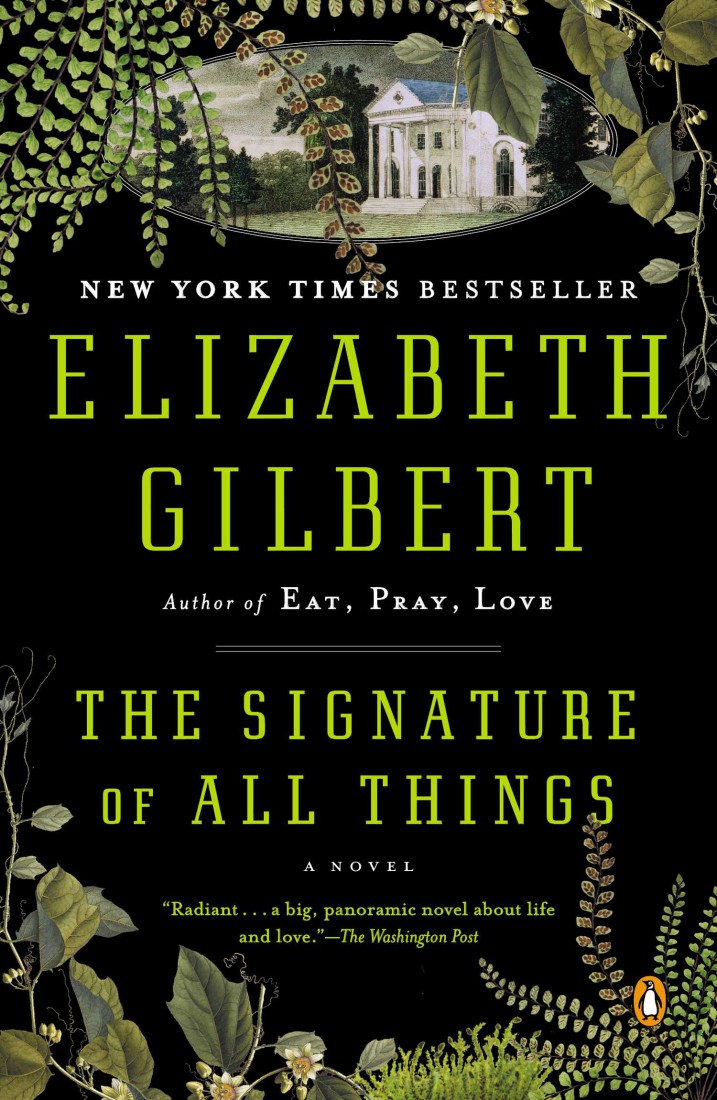The Signature of All Things, the most recent book by Elizabeth Gilbert, begins in the 1700s and sweeps through much of the 19th century. Spanning Europe, Tahiti and pre-Civil War Pennsylvania, it frames several generations of the Whittaker family in the context of botanical exploration. But the ambitious novel, now out in paperback, had an unexceptional genesis.
“I had recently moved to a small town in New Jersey and bought an old house with a big lawn. Almost by instinct, I started a garden,” says Gilbert, best-known for her 2006 chronicle, Eat, Pray, Love. Even though she’d never had a garden before, the author says she found herself fascinated by the plants’ origins. “I didn’t just want to grow them: I wanted to know about them. I found myself running background checks. My lilacs were from Turkey, the wisteria came from China; there was a huge story of human travel and commerce behind every plant in the garden.”
Inspired, Gilbert launched three years of research. “It was like watching the slowest Polaroid ever,” she says. Instead of writing a nonfiction book along those lines, however, Gilbert created Signature, her first work of fiction in more than a decade. Yet the extensive groundwork shows in the book’s dense passages about plant studies and the erudite passions of main character Alma Whitaker.
But unlike Gilbert’s previous protagonists (rugged naturalist Eustace Conway in The Last American Man, the sassy bartender from “The Muse of the Coyote Ugly Saloon,” a GQ feature), Alma is neither self-made nor charming. Instead, she’s intimidatingly smart and far from beautiful: “Large-boned, heavy-jawed” with “trouble puzzling out how to arrange her clothing.”
“I’m aware of what a rare treasure it is to not have to go to a publisher and defend the idea of writing a 500-page novel about a spinster who studies moss,” says Gilbert, who attributes that luxury to her best-selling memoir. “If the good fortune that Eat, Pray, Love provided me didn’t give me the chance to take risks, then what’s the point of it? In a way, to write something so different from Eat, Pray, Love is a celebration of what Eat, Pray, Love gave me.”
Alma, an only child, is born on an estate owned by her formidable father, who made his fortune importing exotic plant species. That enabled him to corner the pharmaceuticals market, then dependent on extracts from such plants as the South American cinchona tree, whose bark was used to stave off malaria. Overeducated and undersocialized, Alma leads a sheltered life interrupted by an adopted sister (the beautiful but cold Prudence), an eccentric friendship (the ditzy Retta) and a mismatched partnership (the artistic but remote Ambrose). Well into midlife, Alma makes the harrowing voyage to Polynesia to unravel mysteries both horticultural and human.
Signature does share themes with Gilbert’s previous works: a spirit of adventure and a less-than-rosy view of marriage. “If this book had a motto, it would be ‘Disappointment doesn’t kill women,’” says the author, adding, “If it did, there wouldn’t be any women left alive.”
Disappointment in marriage and in life is a traditional subject in novels about women, she says, but “I feel like it’s often misunderstood. Women have a tremendous capacity to be let down in love and relationships. … They use some superpower of alchemy to take that and become really interesting people. The women who I admire the most didn’t get as strong and wise and incredible as they are because things worked out.”
Alma echoes that perspective late in Signature, telling a contemporary of Charles Darwin: “I think I have been the most fortunate woman who ever lived. My heart has been broken, certainly, and most of my wishes did not come true. … [Yet] I have never felt the need to invent a world beyond this world, for this world has always seemed large and beautiful enough for me.”
That sentiment seems to be born of Gilbert’s own personal evolution, over the past 25 years, from fear to fascination. “I used to be overwhelmed when I was writing, and now I’m just interested. I’m even interested when I’m scared and overwhelmed,” she says. “I’ve been in it long enough to recognize those patterns. All of these things are like stations of the cross: They’re part of the process.”
Seeing her work through despite boredom, difficulty and discomfort have enabled Gilbert to complete the projects that have reaped such huge rewards, both professionally and personally. She gave a popular 2010 TED talk on the creative process, and she’ll be a featured speaker at Oprah’s The Life You Want Weekend this fall.
“The most radical statement you can make as an artist is to say that you love your work,” says Gilbert. “Believe that inspiration came to you for a reason.”
WHO Elizabeth Gilbert
WHERE Lipinsky Auditorium at UNC Asheville
WHEN Friday, June 27, at 7 p.m. Tickets ($20) include a paperback copy of the book. malaprops.com





Before you comment
The comments section is here to provide a platform for civil dialogue on the issues we face together as a local community. Xpress is committed to offering this platform for all voices, but when the tone of the discussion gets nasty or strays off topic, we believe many people choose not to participate. Xpress editors are determined to moderate comments to ensure a constructive interchange is maintained. All comments judged not to be in keeping with the spirit of civil discourse will be removed and repeat violators will be banned. See here for our terms of service. Thank you for being part of this effort to promote respectful discussion.